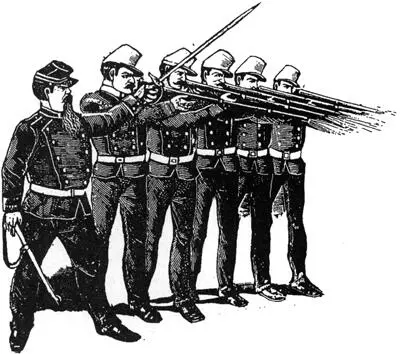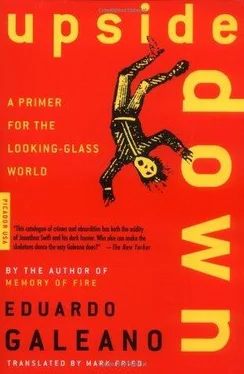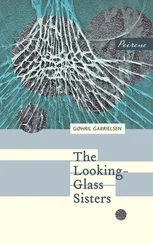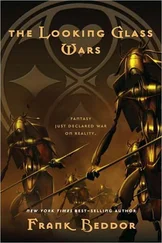For Sale
Here are some of the ads published in the April 1998 issue of the U.S. magazine Corrections Today:
Bell Atlantic offers the “most secure phone systems” for monitoring and screening calls: “Full control over who, when and how inmates call.”
The ad for US West’s inmate telephone service shows a crouching prisoner with a cigarette butt hanging from his lips: “He could cut you up. Somewhere, there could be a hardened criminal concealing a sharpened weapon.”
On another page a threatening shadow, another prisoner, lies in wait: “Don’t give an inch,” warns LCN’s ad for high-security closers. “Any door, not fully latched, is an open invitation to trouble.”
“Inmates are built tougher than ever before,” warns Modu-Form. “Fortunately, so is our furniture.”
Motor Coach Industries shows off its latest-model jail on wheels, something akin to a doghouse divided into steel cages. “Save time. Save dollars,” suggests Mark Correctional Systems, a builder of prisons. “Economy! Quality! Speed! Durability! Security!”
“After all, jail means money,” concludes Nils Christie. And he tells the story of a British parliamentarian, Sir Edward Gardner, who in the 1980s crossed the Atlantic at the head of a European commission to study prison privatization in the United States. Sir Edward was an enemy of private prisons. When he returned to London, he had changed his mind and so became president of the company Contract Prisons, PLC.



SEWING: HOW TO MAKE ENEMIES TO MEASURE

Never have so many economic resources and so much scientific and technological knowledge been brought to bear on the production of death. The countries that sell the world the most weapons are the same ones in charge of world peace. Fortunately for them, the threat of world peace is receding. The war market is on the rebound and the outlook for profits from butchery is promising. The weapons factories are as busy as those producing enemies to fit their needs.
THE DEVIL’S AMPLE WARDROBE
Good news for the military economy, which is to say, good news for the economy: the weapons industry, selling death, exporting violence, is flourishing. Demand is steady, the market is growing, and good harvests continue to be reaped from the cultivation of injustice across the globe. Crime and drug addiction, social unrest, and national, regional, local, and personal hatred are all on the rise.
After a few years of decline at the end of the Cold War, arms sales have turned around. The world market in weaponry, with total sales of $40 billion, grew 8 percent in 1996. Leading the list of buyers was Saudi Arabia at $9 billion. For several years that country has also led the list of countries that violate human rights. In 1996, says Amnesty International, “reports of torture and ill-treatment of detainees continued, and the judicial punishment of flogging was frequently imposed. At least 27 individuals were sentenced to flogging, ranging from 120 to 200 lashes. They included 24 Philippine nationals who were reportedly sentenced for homosexual behavior. At least 69 people were executed.” And also: “The government of King Fahd bin ’Abdul ’Aziz maintained its ban on political parties and trade unions. Press censorship continued to be strictly enforced.”
For many years that oil-rich monarchy has been the top client for U.S. weapons and British war planes. Arms and oil, two key factors in national prosperity: the healthy trade of oil for weapons allows the Saudi dictatorship to drown domestic protest in blood, while feeding the U.S. and British war economies and protecting their sources of energy from threat. A skeptic might conclude that those billion-dollar purchase orders bought King Fahd impunity. For reasons that only Allah knows, we never see, hear, or read anything about Saudi Arabia’s atrocities in the media, the same media that tend to get quite worked up about human rights abuses in other Arab countries. Best friends are those who buy the most weapons. The U.S. arms industry wages a struggle against terrorism by selling weapons to terrorist governments whose only relation to human rights is to do all they can to trample them.
Points of View/7
On a wall in San Francisco: “If voting changed anything, it would be illegal.”
On a wall in Rio de Janeiro: “If men gave birth, abortion would be legal.”
In the jungle, do they call the habit of devouring the weakest the “law of the city”?
From the point of view of a sick people, what’s the meaning of a healthy currency?
Weapons sales are good news for the economy. Are they also good news for those who end up dead?
Points of View/8
Until not so many years ago, historians of Athenian democracy never mentioned slaves or women, except in passing. Slaves were a majority of the Greek population and women half of it. What would Athenian democracy have looked like from their point of view?
The U.S. Declaration of Independence declared in 1776 that “all men are created equal.” What did that mean from the point of view of the half a million black slaves whose status remained unchanged after the declaration was made? And to women, who still had no rights? To whom were they created equal?
From the point of view of the United States, engraving the names of citizens who died in the Vietnam War on an immense marble wall in Washington was a just act. From the point of view of the Vietnamese killed in the U.S. invasion, there are sixty walls missing.
In the Era of Peace, the name applied to the historical period that began in 1946, wars have slaughtered no less than twenty-two million people and have displaced from their lands, homes, or countries over forty million more. Consumers of TV news never lack a war or at least a brushfire to munch on. But never do the reporters report, or the commentators comment, on anything that might help explain what’s going on. To do that they would have to start by answering some very basic questions: Who benefits from all that human pain? Who profits from this tragedy? “And the executioner’s face is always well hidden,” Bob Dylan once sang.
In 1968, two months before a bullet killed him, the Reverend Dr. Martin Luther King Jr. declared that his country was “the world’s greatest purveyor of violence.” Thirty years later the figures bear him out: of every ten dollars spent on arms in the world, four and a half end up in the United States. Statistics compiled by the International Institute of Strategic Studies show the largest weapons dealers to be the United States, the United Kingdom, France, and Russia. China figures on the list as well, a few places back. And these five countries, by some odd coincidence, are the very ones that can exercise vetoes in the UN Security Council. The right to a veto really means the power to decide. The General Assembly of the highest international institution, in which all countries take part, makes recommendations, but it’s the Security Council that makes decisions. The Assembly speaks or remains silent; the Council does or undoes. In other words, world peace lies in the hands of the five powers that profit most from the big business of war.
Читать дальше















